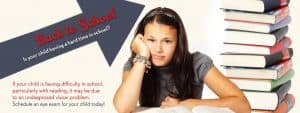Is a vision problem impacting your child’s academic success or athletic performance?
Did you know that vision problems affect up to 25 in every 100 children— that’s at least six students in every class.
This checklist can be a useful tool for your eye doctor to understand all of the behavioral and physical symptoms that your child is experiencing, and may help to facilitate the identification of a vision problem.
Does your child display any of the common behaviors associated with a vision problem?
- One eye drifts or turns in a different direction than the other
- Turns or tilts head while reading or during other visual activities
- Head is frequently tilted to one side or one shoulder is noticeably higher
- Squinting or closing of one eye
- Excessive blinking or squinting
- Poor visual/motor coordination skills (hand-eye coordination)
- Problems judging distances while moving in space
- Frequently bumps into objects or drops things
- Frequently loses items
Does your child display any of the common physical symptoms associated with a vision problem?
- Double vision
- Blurry vision
- Attention difficulties
- Concentration issues
- Headaches or eye strain
- Nausea or dizziness
- Motion sickness or car sickness
If your child displays any of the above symptoms, contact an eye doctor near you.
SEE RELATED: Could Your Child Have Digital Eye Strain?
Does your child display difficulty with reading and other near vision tasks?
- Reading below grade level
- Holds reading material or object too close
- Closes or covers one eye
- Tilts head toward book or object
- Uses finger or ruler to read
- Frequently loses place and/or skips words
- Repeats lines when reading
- Fatigues easily
- Rubs eyes during or after periods of reading or close work
- Reports that words move on page or run together
- Often knocks things over on a desk or table
- Avoids or dislikes homework
If your child shows any of these signs or symptoms, schedule a comprehensive vision evaluation with an experienced eye doctor.
LEARN MORE: Guide to Vision and Learning Difficulties
Early detection of a vision problem will enable your child to get the support they need through eyeglasses, contact lenses, or vision therapy— to enhance their performance in school and on the sports field.









